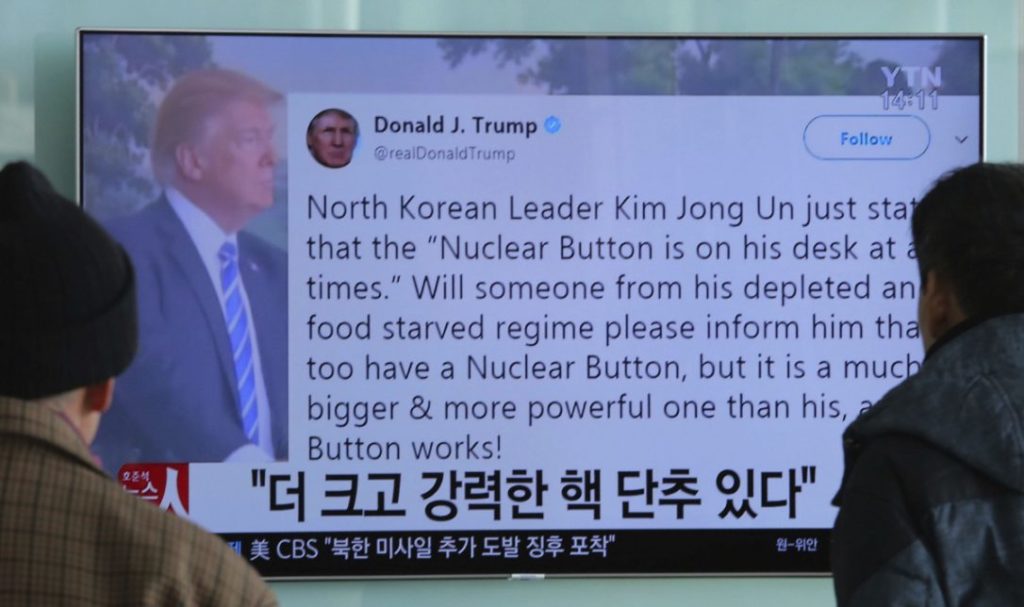How Canada Can Lead North Korean Peace Talks at Vancouver Summit
CONFLICT RESOLUTION - MEDIATION, 8 Jan 2018
Christopher Black and Graeme MacQueen – The Toronto Star
If we Canadians think a lasting peace with North Korea will be obtained by insulting and starving the population of that beleaguered country we are as foolish, and as heartless, as those who put their faith in bombs — getting Canadians thinking critically about the latest diplomatic initiative of their government.

People watch a TV news program showing the Twitter post of U.S. President Donald Trump while reporting North Korea’s nuclear issue at Seoul Railway Station in South Korea on Wednesday. Trump boasted that he has a bigger and more powerful “nuclear button” than North Korean leader Kim Jong Un does, but the president doesn’t actually have a physical button. The letters on the screen read: “More powerful nuclear button.” (Ahn Young-joon / AP)
3 Jan 2018 – Donald Trump has now informed the world that he has a bigger nuclear button than the leader of North Korea. It would be funny if the lives of millions were not at stake.
Trump either does not value, or does not understand, diplomacy. Perhaps our country can do better? We learned with happy surprise on Nov. 28, 2017 that our government will host a diplomatic initiative. Excitedly, many of us combed our news sources for the aims and details of this gathering. Thus far the fruits of our labour have been meagre. What will actually happen in Vancouver on Jan. 16?
To opt for diplomacy instead of military force is surely a good thing. And it has been encouraging to read about how Canada may be able to earn North Korea’s trust more easily than the U.S. The comment by one Canadian official that Canada is looking for “better ideas” than those currently before us is another positive sign, as is Trudeau’s suggestion that Canada’s relationship with Cuba might give us a channel through which to talk to North Korea.
But the Vancouver meeting also has unsettling characteristics.
First, Canada’s partner in organizing the gathering is the United States, an implacable foe of North Korea. Trump and his secretary of defence have recently threatened to commit genocide against the DPRK.
Second, most of the countries to be represented in Vancouver are those that sent troops in the Korean War to fight against North Korea. Might not the North Koreans see this meeting as a step in the formation of a Coalition of the Willing, similar to what preceded the invasion of Iraq in 2003?
Third, it appears North Korea will have no spokesperson in Vancouver. But the current crisis is a manifestation of an underlying conflict, and how can that conflict be solved without consulting one of the main antagonists? Will this be like the Bonn process of 2001 that sorted out the Afghan conflict without consulting the Taliban? That has not turned out well.
When Minister of Foreign Affairs Chrystia Freeland talks about the coming meeting she stresses its diplomatic nature, but U.S. Secretary of State, Rex Tillerson, has characterized it as a means to increase pressure on North Korea.
Pressure? The UN Security Council is already putting such extreme pressure on North Korea that its existence as an industrialized country is threatened and its people may face starvation. What state could survive a 90 per cent cut in its oil supply?
But if increasing pressure does not qualify as a “better idea,” what would?
Here are four ideas. We believe they offer the only realistic hope of a genuine peace.
- Stop insulting North Korea. Banish the term “rogue state.” Forget about who has a bigger nuclear button. Treat the country’s leadership as sane, rational, and capable of being a partner in a peace process.
- Build trust and confidence gradually through positive action. It is not necessary that all such action be economic, but there should certainly be relief from the current economic stranglehold. A series of symbolic exchanges, artistic and athletic, should be part of the plan.
- Recognize that North Korea has valid security concerns and that the desire to have a nuclear deterrent grows out of these concerns. Remember that the country went through a devastating war, has suffered repeated provocations and threats, and has endured targeting by U.S. nuclear weapons for over 65 years.
- Begin serious work toward a permanent peace treaty that will replace the ceasefire agreement of 1953. The U.S. must be a signatory of this treaty.
If we Canadians think a lasting peace with North Korea will be obtained by insulting and starving the population of that beleaguered country we are as foolish, and as heartless, as those who put their faith in bombs.
And if we can do no better in Vancouver than talk about “increasing the pressure” on North Korea the world may never forgive us for squandering our opportunity.
________________________________________
 Christopher Black is an international criminal lawyer on the list of defence counsel at the International Criminal Court.
Christopher Black is an international criminal lawyer on the list of defence counsel at the International Criminal Court.
 Prof. Graeme MacQueen is co-editor of the Journal of 9/11 Studies and co-author, with Johan Galtung, of Globalizing God-Religion, Spirituality and Peace, TRANSCEND University Press, 2008.MacQueen was founding director of the Centre for Peace Studies at the McMaster University in Hamilton, Ontario, where he taught for 30 years. He holds a Ph.D. in Buddhist Studies from Harvard University and is a member of the TRANSCEND Network for Peace Development Environment. MacQueen was an organizer of the Toronto Hearings on 9/11, is a member of the Consensus 9/11 Panel, and is a former co-editor of the Journal of 9/11 Studies.
Prof. Graeme MacQueen is co-editor of the Journal of 9/11 Studies and co-author, with Johan Galtung, of Globalizing God-Religion, Spirituality and Peace, TRANSCEND University Press, 2008.MacQueen was founding director of the Centre for Peace Studies at the McMaster University in Hamilton, Ontario, where he taught for 30 years. He holds a Ph.D. in Buddhist Studies from Harvard University and is a member of the TRANSCEND Network for Peace Development Environment. MacQueen was an organizer of the Toronto Hearings on 9/11, is a member of the Consensus 9/11 Panel, and is a former co-editor of the Journal of 9/11 Studies.
DISCLAIMER: The statements, views and opinions expressed in pieces republished here are solely those of the authors and do not necessarily represent those of TMS. In accordance with title 17 U.S.C. section 107, this material is distributed without profit to those who have expressed a prior interest in receiving the included information for research and educational purposes. TMS has no affiliation whatsoever with the originator of this article nor is TMS endorsed or sponsored by the originator. “GO TO ORIGINAL” links are provided as a convenience to our readers and allow for verification of authenticity. However, as originating pages are often updated by their originating host sites, the versions posted may not match the versions our readers view when clicking the “GO TO ORIGINAL” links. This site contains copyrighted material the use of which has not always been specifically authorized by the copyright owner. We are making such material available in our efforts to advance understanding of environmental, political, human rights, economic, democracy, scientific, and social justice issues, etc. We believe this constitutes a ‘fair use’ of any such copyrighted material as provided for in section 107 of the US Copyright Law. In accordance with Title 17 U.S.C. Section 107, the material on this site is distributed without profit to those who have expressed a prior interest in receiving the included information for research and educational purposes. For more information go to: http://www.law.cornell.edu/uscode/17/107.shtml. If you wish to use copyrighted material from this site for purposes of your own that go beyond ‘fair use’, you must obtain permission from the copyright owner.
Read more
Click here to go to the current weekly digest or pick another article:
CONFLICT RESOLUTION - MEDIATION: